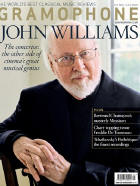Texte paru dans: / Appeared in: |
|
|
Outil de traduction |
|
|
Katharina Bäuml and her stylish period wind ensemble are back. Recent recordings have been all-German affairs, but now Capella de la Torre return to sunny Italy for a pastel-pretty set of musical postcards from Claudio Monteverdi. If the title suggests gentle nostalgia, there’s none of that from a programme that is more interested in looking to the musical future. Silke Leopold’s elegant booklet notes tease out the strands of influence and legacy stretching outwards from Monteverdi as far as jazz, blues and pop music. It’s advance warning of a musical approach that won’t be to everyone’s taste: a blend of authenticity and sly anachronism, affection and irreverence that follows very much in the footsteps of Christina Pluhar and L’Arpeggiata. The shadow of the latter’s ‘Teatro d’amore’ (Erato, 6/09) looms over a programme that shares some of its repertoire and even more of its spirit. These are period experts playing just a little loose with music that’s in their bones. Depending on your taste, it’s either a playful musical nod across centuries and genres or a minor lapse in judgement. Mike Turnbull’s percussion is much more ubiquitous than a glance down the track-listing would initially suggest. Underpinning the breathless back-andforth of ‘Zefiro torna’ or shimmying gently through Scherzi muscali’s ‘Damigella’, his rhythms offer a witty nod towards jazz, but in the sacred repertoire – grooving away under the solo tenor ‘Laudate Dominum in sanctis eius’ and a persistent, syncopated presence under a noticeably swung ‘Beatus vir’ – they perhaps press their advantage. The 13-strong band is, however, a real treat. A belchy curtal joins a whole family of sackbuts, there’s a shawm and recorder as well as a bright cornetto, and violins are amplified by a violone, theorbos and an organ. All of which gives Bäuml a wonderfully rich and varied palette to draw on. The textural breadth is gloriously established in the opening ‘Movete al mio bel suon’, and instruments and voices are doubled and echoed throughout in striking combinations – Bäuml’s preference for light solo soprano voices (notably in ‘Ohimè, ch’io cado’ and ‘Zefiro torna’) generates a lovely sheen in dialogue with upper woodwind. Does it all add up to a consistent musical argument? I’m not sure. But whether or not you find yourself persuaded by the end, you’re guaranteed plenty of colour and entertainment along the way. |
|




